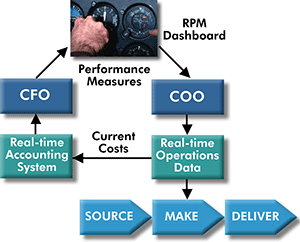Real-time Performance Management (RPM) is a management practice that measures performance in real-time. These measures are used to adjust targets to exploit current market conditions and improve business agility.
RPM provides a strategy for success with the very dynamic business conditions confronting today's manufacturers. The focus is on operational cost and profitability measures for resource allocation and decision making. Dynamic performance targets adapt to changing definitions of what is important and what is acceptable performance. The real-time monitoring of performance measures and external factors keep the corporation focused on the "right things".
Why Real-time Performance Management (RPM)?
 Rather than using dated accounting-based measurements, RPM solutions provide an executive the tools to manage their business based on current, real-time conditions. The disconnect between fixed, historically-based accounting measures and current operating costs drives sub-optimal business performance. Standard costs are usually wrong in that they do not match current costs. For example, try to determine if a particular product meets your margin goals. Do you get ugly surprises at the end of an accounting period?
Rather than using dated accounting-based measurements, RPM solutions provide an executive the tools to manage their business based on current, real-time conditions. The disconnect between fixed, historically-based accounting measures and current operating costs drives sub-optimal business performance. Standard costs are usually wrong in that they do not match current costs. For example, try to determine if a particular product meets your margin goals. Do you get ugly surprises at the end of an accounting period?
Specific operational KPIs that make sense for a particular product mix may lead to counterproductive behaviors when compared to actual market demands. One common management methodology is to use historic costs to derive a budget and future costs. Historic performance contains past costs for downtime, scrap, downgraded goods, and others. With this approach, history is given substantial credibility and the perception that there are many unavoidable costs of doing business. Measures based on traditional cost accounting systems sustains tens or even hundreds of millions of dollars of avoidable costs.
Real-time Performance Management's (RPM's) guiding principles
- Monitor performance in real-time
- Let customer needs drive collaboration
- Allocate resources as needed
- Empower local teams to continuously improve the action plan
- Structure rewards to encourage collaboration among internal teams
- Adjust targets to drive optimum performance
Real-time Performance Management (RPM) Cultural Change
Internal bias often fogs our vision. Senior executives need to drive a cultural change while moving their organization to Real-time Performance Management. The concept of real-time measurements and dynamic performance targets involves much more then just technology. People need to be weaned from their traditional methods while learning and becoming comfortable with new business processes.
Real-time Performance Management (RPM) Execution
Real-time monitoring of internal performance enables the company to react rapidly to significant developments. Using real-time information to drive actions empowers decision-makers at the time of greatest impact, i.e., when they make a decision. Solutions are emerging that enable real-time monitoring across an extended enterprise.
Static objectives sub-optimize profits in today's dynamic environment. Unit managers often lose focus on the core drivers of corporate profitability. Two types of dynamic targets are critical:
- Financial targets for managers with profit and loss responsibility
- Performance targets for operational personnel that help to insure meeting the financial targets.
Dynamic performance targets can and must be applied to operations, supply chain, and logistics.
How Can ARC Help?
ARC analysts have hands-on experience with technology and an in-depth understanding of manufacturing systems. We can help with the following:
- Executive workshop on RPM and the business case for change
- Using RPM to help comply with the Sarbanes-Oxley Act
- Understanding Best Practices and their applicability to your business
- Drive cultural change with employee educational seminars and training
- Architecture and the supplier selection process


